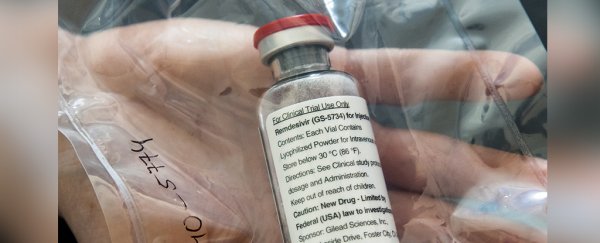COVID-19 patients on the antiviral remdesivir recovered about 30 percent faster than those on a placebo, the results of a major clinical trial showed Wednesday, as a top US scientist hailed the drug's "clear-cut" benefit.
Although not yet considered an outright cure, it represents the first time any medication has been shown to improve outcomes against the COVID-19 illness, which has claimed more than 200,000 lives globally and brought the world economy to a grinding halt.
A statement by the US National Institute of Allergy and Infectious Diseases (NIAID) that oversaw the trial said that patients on the drug, made by Gilead Sciences, had a 31 percent faster time to recovery than those on a placebo.
"Specifically, the median time to recovery was 11 days for patients treated with remdesivir compared with 15 days for those who received placebo," it said.
Anthony Fauci, who leads the NIAID, told reporters at the White House: "The data shows that remdesivir has a clear-cut, significant, positive effect in diminishing the time to recovery."
He added: "Although a 31 percent improvement doesn't seem like a knockout 100 percent, it is a very important proof of concept because what it has proven is that a drug can block this virus."
The results also suggested that people who were on the drug were less likely to die, although the difference was quite small. The mortality rate was 8.0 percent for the group receiving remdesivir versus 11.6 percent for the placebo group.
The trial began on February 21 and involved 1,063 people across 68 locations in the US, Europe and Asia.
The first patient to be enrolled was an American who was repatriated after being quarantined on the Diamond Princess cruise ship and was treated at the University of Nebraska Medical Center.
Neither the patients nor their physicians were aware of which group they belonged to, in order to eliminate unconscious bias.
Peter Horby, an epidemiologist at the University of Oxford who was not involved in the study, said: "We need to see the full results, but if confirmed this would be a fantastic result and great news for the fight against COVID-19."
Scott Gottlieb, a former commissioner of the Food and Drug Administration (FDA), wrote on Twitter: "There's now enough data to support consideration of access under an emergency use authorization."
This would allow doctors to prescribe the drug outside of the context of clinical trials.
THREAD: What is the significance of news today that there may be a drug active against covid? It's a beginning: The start of our ability to build a much better toolbox to combat the infection, mitigate risk today as well as from outbreaks that are likely to occur this Fall. 1/n
— Scott Gottlieb, MD 🇺🇸 (@ScottGottliebMD) April 29, 2020
Blocks viral replication
Remdesivir, which previously failed in trials against Ebola, belongs to a class of drugs that act on the virus directly - as opposed to controlling the abnormal and often lethal autoimmune response it causes.
It mimics one of the four building blocks of RNA and DNA and gets absorbed into the virus's genome, short-circuiting its replication process.
In his remarks to the press, Fauci indicated that since this approach had yielded some success, it could pave the way for better drugs adopting the same model.
While the findings were broadly welcomed by scientists, some cautioned that the benefits were relatively modest.
"This is the first evidence that remdesivir has genuine benefits, but they are certainly not dramatic," said Stephen Evans, a medical statistics expert at the London School of Hygiene & Tropical Medicine.
"These data are promising, and given that we have no proven treatments yet for COVID-19, it may well lead to fast-track approval of remdesivir for treatment of COVID-19," said Babak Javid, principal investigator of Tsinghua University School of Medicine in Beijing.
"However, it also shows that remdesivir is not a magic bullet in this context."
There had been mixed news about the intravenous antiviral in recent weeks.
A summary of results posted on the website of the World Health Organization last week showed it failed in a smaller Chinese trial. The Lancet on Wednesday published the formal paper describing that experiment.
In this study of 237 patients in Wuhan, China, doctors found no positive effects of administering the drug compared with a control group of adults, except for those patients who required ventilators.
But the Chinese test had to be halted early because it could not recruit enough people to meet its initial goals, and was considered by many experts to be too small to draw reliable conclusions from.
Fauci said it was "not an adequate study."
Apart from remdesivir, the antimalarial drugs hydroxychloroquine and chloroquine are also being widely used against COVID-19 on a so-called "compassionate basis" pending results from large trials.
Other therapies that are being studied include collecting antibodies from COVID-19 survivors and injecting them in patients, or harvesting antibodies from genetically-engineered mice that were deliberately infected.
